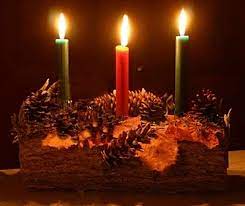The Pagan origins of Christmas

A traditional Yule log
December 19, 2022
Approximately eighty-five percent of Americans observe Christmas, a Christian holiday celebrating the birth of Jesus Christ. Although the holiday is Christian in nature, many of the typical traditions associated with Christmas derive from Paganism.
Most historians agree that Christmas traditions and celebrations can trace their roots back to ancient Pagans, specifically early Europeans. The precursor to Christmas is commonly regarded as the Scandinavian holiday of Yule. During Yule, the Norse people would celebrate the winter solstice by lighting traditional Yule logs, decorating evergreen trees, and exchanging presents with family. The Yule celebrations could last up to twelve days, complete with feasts, decorations, and dancing.
Another Pagan holiday commonly associated with Christmas is the Roman holiday of Saturnalia. Saturnalia, commonly held in mid-December, celebrated the winter solstice and paid tribute to Saturn, the Roman god of agriculture. On this special occasion, Romans spread holiday cheer by feasting, hanging wreaths, and giving gifts.
Contrary to popular belief, most Christians do not recognize December 25 as Jesus Christ’s real birthday. There is some evidence to suggest Christ was born in the winter, although his day of birth was never specifically stated in the Bible. It makes sense, however, that Jesus’ birth was joined with the winter holiday of Saturnalia. As Christianity began to reign over the Roman religions, Christians combined Abrahamic beliefs with existing Pagan traditions.
As Christianity left Rome and spread through Europe, other winter holidays such as Yule began to merge with pre-existing Christian doctrine and Roman traditions. This melting pot of culture and religion formed the Christmas we all recognize today.
Today, Christmas is celebrated all over the world, by Christians and non-Christians alike. Modern day Pagans still celebrate Yule and Saturnalia as well. December is a month full of holidays like Hanukkah, Kwanzaa, Bodhi Day, the Advent Fast, and more. However you choose to celebrate this month, stay warm, safe, and happy with family and friends. Happy holidays!

